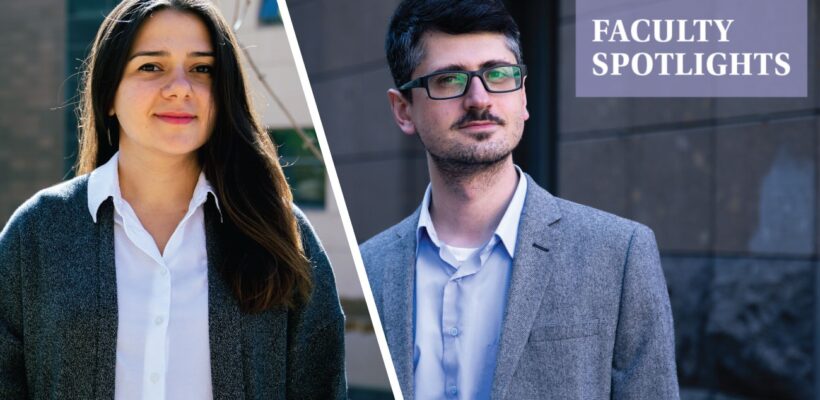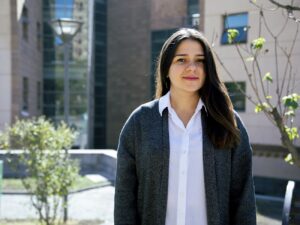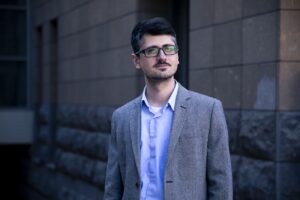
AUA Assistant Professorship Initiative Attracts Two New Faculty
6 min readYEREVAN, Armenia — At the start of the 2022-23 academic year, the American University of Armenia (AUA) welcomed the first two professors hired within the scope of the Assistant Professorship program initiated in fall 2021. The program was launched as part of the University’s Open Centers of Excellence (OCE) initiative and is funded by the 200 AUA ChangeMakers campaign.
The goal of the program is to attract emerging talent to help the University realize a new level of excellence in research and outreach. Dr. Hripsime Mkrtchyan and Dr. Rafayel Petrosyan are based in the Akian College of Science and Engineering (CSE) and work closely with OCEs.
Dr. Hripsime Mkrtchyan
 “It all started when someone told me physics is not for girls.”
“It all started when someone told me physics is not for girls.”
Hripsime Mkrtchyan earned her bachelor’s and master’s degrees from Yerevan State University (YSU) department of Nuclear Physics and her doctorate from the Alikhanian National Science Laboratory of Yerevan Physics Institute. Later, she became a Fullbright postdoctoral fellow at the Civil and Environmental Engineering department of Massachusetts Institute of Technology (MIT), where her research focused on radiation coming from thunderclouds and its electrical structure based on remote sensing.
A young researcher, she has already managed to join a wide range of international collaborations, including the Leadership Committee of Atmospheric and Space Electricity of the American Geophysical Union; Historical Sites Selection Committee of European Physical Society; and the Action Committee of Young Minds project of European Physical Society. She is also a board member of the Young Scientists’ Support Program of Armenia.
Dr. Mkrtchyan has participated in a number of scientific events and conferences, sharing her research findings with the international scientific community. Her current research is on atmospheric physics, an unexplored area in Armenia. She studies the electrical structure of thunderclouds, lightning activity, and lightning climatology, and has published in peer reviewed journals, such as the Journal of Atmospheric and Solar-Terrestrial Physics, International Journal of Biometeorology, Physical Review, Journal of Atmospheric, and Solar-Terrestrial Physics, among others. Her most recent publication is on radiation coming from thunderclouds, a groundbreaking work in the sphere. “For the first time in Armenia, we were able to merge remote sensing observation with in situ measurements and recover the picture of thunderclouds structure during the radiation process,” she explains.
Currently, she is collaborating with the AUA Acopian Center for the Environment (ACE), co-teaching with ACE Director Alen Amirkhanian and also working on environmental science projects. She also has collaborative projects with scientists abroad, jointly researching topics of shared interest.
Asked what brought her to AUA, she responds, “In order to have a successful career in Armenia, one needs to break many walls. In Western culture, where I spent the last year, it’s different, you always have a hand that will help you. When I was back in Armenia, I faced challenges, and I started thinking that maybe I should go somewhere else to gain more experience; I felt that I didn’t have enough experience to start something from scratch. But when I learned about AUA’s assistant professorship program, I thought that it would be just the right place for me. I thought that at AUA, which is a Western-style university, I will have the freedom I always felt I needed in Armenia, and that I can start my research here and maybe even expand to form a research group.”
As Dr. Mkrtchyan claims her research can be helpful for our country not only as a contribution to science but also in terms of innovative solutions in agriculture and many other areas. “I’m doing fundamental research that builds new knowledge and theory, which can subsequently be transformed into practical applications and make real contributions,” she says.
As a woman in science, Dr. Mkrtchyan mentions her top reasons for doing science. “Science gives you freedom,” is her number one reason. Then she enumerates several others. “Science is an international language; it gives you the chance to communicate with people of different nationalities and cultures in a common language. Science promotes self education. Science protects you. It helps create infrastructure that can be beneficial not only for the scientist, but for the whole society. Science helps you build new skills; create something new.” She then sums up, “I tell my students that I have a dream to create knowledge that they will find in their books. Everything you read in your books now was someone’s research discovery, that’s what I tell them.”
With her work, Dr. Mkrtchyan has always sought to promote science in Armenia. She believes that proper science education should start in schools where students should “feel” science doing experiments and not just study theory. Another way to promote science, according to her, is to have one day in the calendar marked as science day in our country. On that day, everybody will meet scientists, speak with them, learn from them, see what kinds of experiments they are doing. She is confident that this is the way to “build bridges” between the scientific community and the public and learn about all the amazing experiments our local scientists are into. “We should invest more in science because strong science means a strong Armenia. I’m very happy that AUA has started to invest in research. I hope that in the near future, we will have laboratories for AUA faculty and students to explore new phenomena. Right now I’m thinking of establishing a small lab where our students can see the near surface electric field measurements, measure meteorological parameters, see how temperature changes, and so on,” she elaborates.
Dr. Mkrtchyan believes that her professional career path sculpted her into the person she is. Physics made her stubborn and purposeful. “I just don’t stop pursuing my goals and I want everyone who will read this about me to never doubt their abilities. One just needs to work hard. It was hard for me in different periods of my career, and I know I will face more hardships in my future endeavors, but I’m ready to embrace all the challenges and keep learning,” she sums up.
Dr. Rafayel Petrosyan
 “Even the most successful scientists have difficult times. Experiments may not work for months, and that’s normal, you should just keep trying harder and approach the problem from a different angle.”
“Even the most successful scientists have difficult times. Experiments may not work for months, and that’s normal, you should just keep trying harder and approach the problem from a different angle.”
Rafayel Petrosyan earned his bachelor’s from YSU’s Molecular Physics department. After graduation, he moved to Germany to pursue a master’s at the Biotechnology Center of the Dresden University of Technology (TU Dresden), and then to Swiss Federal Institute of Technology in Zurich (ETH Zurich), Department of Biosystems Science and Engineering, for his doctorate. After that, he did a postdoctoral fellowship at the department of Physics of the University of Alberta, Canada. Having finished his postdoc, he started applying for academic positions and was successful in getting an assistant professorship at AUA.
With a background in experimental biophysics, at AUA he started to engage more in theoretical studies, particularly focusing on the application of machine learning algorithms for analyzing data from biophysics experiments. He is also involved in AUA’s Center for Data-Driven Biosciences, working on projects that deal with methods of analyzing single molecules for spectroscopy data and model selection. Fascinated with science and inspired to explore new scientific breakthroughs, Dr. Petrosyan is eager to work in the field. “I’m excited to apply machine learning to analyze biophysical data and answer questions that were previously unanswered,” he remarks, as he elaborates on the different phases of development that brought different computational methods, from simple nature observation to big data analysis.”
Dr. Petrosyan is a member of the Biophysical Society which aims to lead the development and dissemination of knowledge in biophysics. He has presented his research in international conferences, as well as published in high impact factor peer-reviewed journals, such as the Proceedings of the National Academy of Sciences of the United States of America, Nano Letters, and Biophysical Journal. Among his other projects, he mentions a recently accepted paper in Protein Science, focusing on the evolutionary aspects of prion protein which is found in almost all species and causes neurodegenerative diseases in mammals. The project is a collaborative effort with researchers from the University of Oregon to reveal the evolutionary stage in which the protein started to cause diseases. Despite the fact that the community of biophysicists is relatively small in Armenia, Dr. Petrosyan believes there is good potential for new discoveries in the field. “Our local biophysicists should collaborate with biophysicists abroad. Also, given the situation with funding in Armenia, we should find our niche and tackle problems where it is possible to gain significant results with relatively cheap experiments,” he notes.
Speaking of future plans, Dr. Petrosyan aims to form a research group at AUA that will involve students and other researchers from elsewhere in Armenia or abroad. “I came to AUA because of its vision to expand research, which is a very important aspect for the growth of any university,” he says, adding, “Hopefully, when the new Science & Engineering Building of AUA is ready, we will also have labs, where we will be able to conduct experiments and test our hypotheses.”
While scientific research may be overwhelming at times, Dr. Petrosyan never lacks motivation to work hard and move forward. According to him, whenever there’s an issue, the best a researcher can do is to temporarily step back and relax, then come back to give it another try.
Founded in 1991, the American University of Armenia (AUA) is a private, independent university located in Yerevan, Armenia, affiliated with the University of California, and accredited by the WASC Senior College and University Commission in the United States. AUA provides local and international students with Western-style education through top-quality undergraduate, graduate, and certificate programs, promotes research and innovation, encourages civic engagement and community service, and fosters democratic values.
